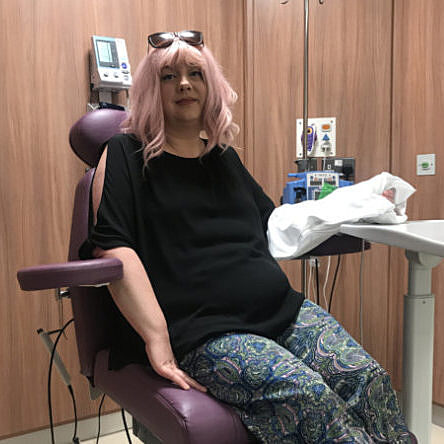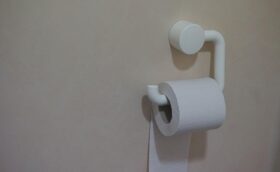You may be one of those lucky people who never get a urinary tract infection (UTI) or you may be like me: plagued with them throughout my life. Some people just seem to be prone to them, and most of those unfortunate souls are women.
A UTI is an infection involving any of the urinary tract organs…
I had them constantly after my son was born and I never really took them that seriously. It was just another trip to the doctors for antibiotics. It got to a point where I would just drop off my bottle of pee at the surgery and get a call later that day to pick up a prescription.
So just how serious is a UTI? Left untreated it can become very serious – you could run the risk of sepsis.
It can make you feel lousy. You may have a high temperature, the shivers, pain when you pee, and you may need to go more frequently with more urgency than usual, only to find when you get to the loo, you only pee a tiny bit, or it may burn like razor blades. It is not fun!
Women are more likely to get UTIs, joy of joys! This is partly due to having a shorter urethra than men do (it means that bacterial has a far shorter journey to travel) and possibly the menopause. It has been debated whether the changes in a woman's urinary tract with age are due to menopause and the lack of estrogen, or instead related to the aging process alone. We do know, however, that the bladder is loaded with estrogen receptors, so menopause probably doesn't help.
There are two types of UTI: an upper tract infection which includes your kidneys and your urethra, or a lower tract infection which would involve your bladder and urethra.
Acute pyelonephritis is a bacterial infection causing inflammation of the kidneys and is one of the most common diseases of the kidney. Pyelonephritis occurs as a complication of an ascending urinary tract infection (UTI) which spreads from the bladder to the kidneys and their collecting systems, so catching a UTI before it spreads is vital.
With an upper tract infection, you may experience pain or an aching feeling in your lower back/side around your kidney area, a high fever, shivering, nausea and even vomiting in some cases.
Lower tract infections include cystitis and urethritis, symptoms include feeling pressure in your pelvis – this is different to the ‘wanting to pee’ feeling. It feels uncomfortable and sometimes you can have stabbing pains. You will be peeing more as your bladder becomes irritated and you may or may not have blood in your urine. Your pee could become very smelly and cloudy – cloudy pee is not okay! Remember: always get your pee checked if you see blood as it could be a sign of something more which needs investigation… or it could just be your period so no panic there!
With urethritis, you may experience a burning sensation when you pee, it will sting, and in my experience, it felt like I was peeing knives. You could get a discharge from this… it makes you feel ‘raw’ down there and you won’t be able to concentrate on anything else.
I have found that drinking half a pint of water mixed with one teaspoon of baking powder, helps to ease these symptoms.
If you don't catch it before it gets to this point, I use a wonderful anti-itch cream that takes away the burning feeling. I will warn you though, it does warm up before it soothes… bliss. (Please talk to your doctor or a pharmacist before using an anti-itch cream on your genitals as it is may not be suitable).
Cystitis is usually caused by Escherichia coli, more commonly known as E. coli, which is found in the gastrointestinal tract, or the GI tract to you and I (why does everything have to have long, unpronounceable names?). This can also be transmitted when we have sex. It’s important to pee after having sex as this may actually help to prevent transmission of bad bacteria!
Cystitis makes you feel awful and you will worry about where the nearest loo is. It is important the minute you think you have a UTI, to drink more water but try not to take a large amount in one go or you will flood your kidneys and they’ll find it hard to filter everything through.
Ladies, are you ever that busy that you just ‘haven't got the time’ to go to the toilet?
If you answered ‘yes’ to the above then you will also be more susceptible to UTIs as bacteria will start to grow in the urine in your bladder. I was so guilty of this, especially when I worked as a professional driver. Time was valuable, and we had to pick up three cars daily from anywhere in the country and bring them back to a car market. You were so rushed that even taking five minutes to find a loo and have a pee could set you back hours (thanks to the car park named the M25) and if you did find a loo, it would be in a service station and not one of the posh ones, and sometimes you’d rather pee in a bush than in there! This is not good for your bladder health.
Over the years I have tried many things to help with my UTIs.
I hate taking antibiotics (or any type of pills) as they disrupt my tummy and make me feel generally ‘bleugh’ however, I do accept that they are a must in many cases.
My advice to avoid a UTI would be:
- Hydrate yourself (unless you have been advised to limit your intake by a healthcare professional) – make sure you drink enough, sluggish kidneys aren't good, you will feel that you ‘lack’ energy.
- Cranberry juice – some people believe that cranberry juice can help to prevent bacteria sticking to your bladder wall thus preventing UTIs. It does depend of the quality of the cranberry juice though, and you should always check that you aren’t taking any medications which contraindicate cranberry. I tried half a glass on a daily basis but still ended up with infections, still, you lose nothing by drinking it. If it works for you then that’s great.
- Wiping yourself after peeing – wipe from front to back or just dab, and don't use any of those feminine products filled with chemicals down there. We don't need them, just wipe with a little tissue.
- Peeing after sex – enough said!
I have been reading studies about the impact Vitamin C has on preventing UTIs. There’s nothing conclusive yet but I do find it interesting, so I may add this to my list of daily pills to pop!
I’ve been experiencing recurrent UTIs for years, read about my journey and hear my tips for avoiding them.

Article by Anita Brown
About the author
Hi I’m Anita Brown. Diagnosed with terminal small cell bladder cancer in April 2016. I've had palliative chemo and radiotherapy, and a radical cystectomy and urostomy in August 2017.
I've had problems with my bladder all my life, from incontinence, to kidney and bladder stones, and now cancer. I would like to share some of my experiences - follow me on Twitter.
